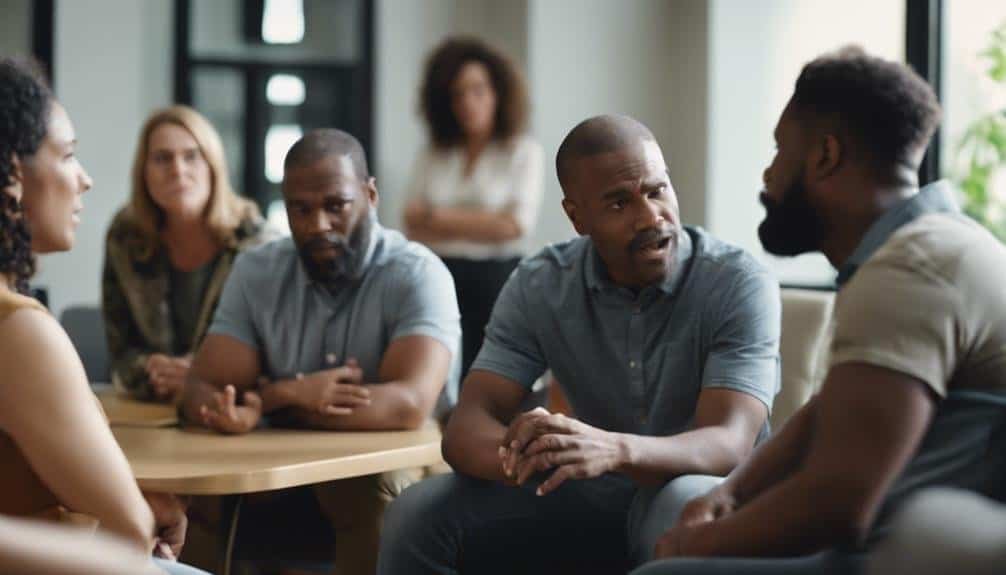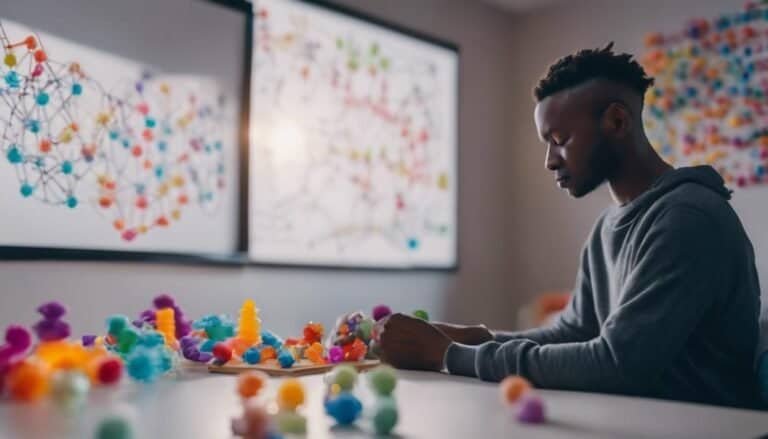Social Skills Training in Therapy
You may not be aware that social skills training in therapy can greatly impact your interpersonal relationships. Understanding the nuances of communication, emotional intelligence, and social behaviors can be transformative.
Imagine gaining practical strategies and confidence to navigate social situations effortlessly. By enhancing your social competence through therapy, you could see improvements in your overall well-being.
Intrigued to explore how these skills can reshape your interactions and connections?
Key Takeaways
- Enhances awareness of social cues through structured interventions
- Develops effective communication skills for better interactions
- Improves emotional intelligence for navigating social challenges
- Utilizes role-playing exercises to practice and enhance social behaviors
Understanding Social Skills Training
To grasp the essence of social skills training, one must explore the systematic development of interpersonal abilities through structured interventions. Social cues play a fundamental role in the domain of interpersonal relationships. Understanding these cues is important for successful communication and building meaningful connections with others. Social skills training aims to enhance an individual's awareness and comprehension of these cues, ultimately improving their ability to navigate social interactions effectively.
Through targeted exercises and role-playing scenarios, individuals learn to recognize and interpret various social cues, such as facial expressions, body language, and tone of voice. By honing these skills, they can better understand the thoughts and emotions of others, leading to more successful interactions and relationships. Furthermore, social skills training provides a safe and supportive environment for individuals to practice and refine their newfound abilities, boosting their confidence in social settings.
Importance of Communication Skills
Enhancing your communication skills is essential for fostering effective interactions and building strong relationships in various aspects of life. Communication skills encompass verbal and non-verbal methods of exchanging information, thoughts, and feelings. By honing these skills, you can navigate social situations with confidence and clarity.
When it comes to improving communication, vital training and self-expression techniques play a significant role in helping individuals convey their thoughts and feelings assertively yet respectfully. Additionally, empathy building and relationship-building strategies are fundamental for understanding others' perspectives, fostering deeper connections, and resolving conflicts amicably.
To further illustrate the importance of communication skills, the table below outlines key elements related to effective communication:
| Communication Skills Aspect | Description | Importance |
|---|---|---|
| Verbal Communication | Use of words to convey | Clarity in expressing thoughts |
| Non-Verbal Communication | Body language, gestures | Enhancing message understanding |
| Active Listening | Engaging in conversations | Building rapport and trust with others |
| Emotional Regulation | Managing emotions | Avoiding conflicts and misunderstandings |
Enhancing Emotional Intelligence
Improving emotional intelligence involves recognizing and managing your own emotions effectively in various situations. Emotional regulation plays a vital role in this process, helping you navigate through challenging circumstances with composure. Self-awareness is another key aspect, enabling you to understand your emotions and reactions better, leading to more controlled and thoughtful responses.
Enhanced Emotional Resilience: Developing emotional intelligence can help you bounce back from setbacks more effectively, fostering a sense of resilience and strength in the face of adversity.
Improved Interpersonal Connections: By honing your emotional intelligence, you can enhance your interpersonal relationships by showing empathy and understanding towards others, leading to deeper and more meaningful connections.
Better Conflict Resolution Skills: With increased emotional intelligence, you can navigate conflicts more skilfully, addressing differences with a calm and rational approach that fosters resolution rather than escalation.
Role-Playing Exercises in Therapy
Engage in role-playing exercises during therapy sessions to enhance your social skills and improve your ability to navigate various interpersonal scenarios effectively. Role-playing scenarios provide a structured environment where you can practice different social interactions, receive feedback, and refine your responses. Incorporating improvisation techniques into these exercises can further challenge you to think on your feet and adapt to dynamic conversations. By actively participating in role plays, you can develop a deeper understanding of social cues, communication styles, and conflict resolution strategies.
| Role-Playing Scenario | Objective | Benefits |
|---|---|---|
| Job Interview | Practice answering questions confidently | Improve interview skills and reduce anxiety |
| Conflict Resolution | Learn to manage disagreements effectively | Enhance conflict resolution abilities and communication |
| Networking Event | Develop networking and conversation skills | Build confidence in social settings and expand social circle |
Incorporating these role-playing exercises into your therapy sessions can help you transfer these newly acquired social skills from the session to real-life situations effectively.
Practical Strategies for Social Behaviors
To enhance your social behaviors, focus on nonverbal cues and their importance in communication.
Practice active listening techniques to show genuine interest in others and improve your interpersonal skills.
These practical strategies can help you navigate social situations more effectively and build stronger connections with those around you.
Nonverbal Cues Importance
Understanding the significance of nonverbal cues is essential in developing effective social behaviors during social skills training in therapy. Body language and emotional expression play pivotal roles in how we communicate with others. Here are three key points to take into account:
- Eye Contact: Maintaining appropriate eye contact conveys interest and engagement in a conversation.
- Gestures: Using gestures that align with your words can enhance understanding and connection.
- Facial Expressions: Expressing emotions through facial cues helps others interpret your feelings accurately.
Active Listening Techniques
Active listening techniques are foundational for enhancing social behaviors and fostering meaningful connections during social skills training in therapy. By actively listening, you demonstrate genuine interest in the speaker and create a supportive environment for effective communication.
One key aspect of active listening is maintaining eye contact, which shows attentiveness and respect. Additionally, mirroring the speaker's body language and using verbal cues such as nodding or paraphrasing their words can enhance understanding and rapport.
Engaging in active listening not only helps in comprehending the message but also conveys empathy and validation to the speaker. Practicing active listening regularly can greatly improve your communication skills and enrich your relationships both in therapy and in everyday interactions.
Receiving Constructive Feedback
When receiving constructive feedback in a therapeutic setting, it's essential to approach it with an open mind and a willingness to learn and grow. Receiving feedback is a critical aspect of developing social skills and improving interpersonal relationships. Here are some key points to contemplate:
- Be Open-Minded: Embrace feedback as an opportunity for personal growth rather than a criticism of your character.
- Reflect on Feedback: Take the time to reflect on the feedback received and contemplate how it aligns with your goals and values.
- Ask for Clarification: If the feedback is unclear, don't hesitate to ask for further explanation to guarantee you fully understand and can act upon it effectively.
Constructive feedback is a valuable tool in therapy that can help you enhance your social skills and navigate social interactions more confidently. By approaching feedback with a positive mindset and a willingness to learn, you can make significant strides in your personal development journey.
Developing Confidence in Social Situations
Upon receiving constructive feedback and reflecting on ways to improve your social skills, developing confidence in social situations becomes a natural progression towards enhanced interpersonal interactions. Confidence in social settings can be nurtured through various means, with public speaking and networking skills playing important roles in building this self-assurance.
Public speaking, often feared by many, can actually be a powerful tool for boosting confidence. By practicing and honing your public speaking abilities, you not only improve your communication skills but also learn to exude confidence in front of others. This newfound confidence can then translate into other social situations, allowing you to express yourself more effectively and assertively.
Networking skills are equally important in developing confidence in social settings. Learning how to initiate and maintain conversations, build connections, and leave a lasting impression can greatly boost your self-esteem. By mastering networking skills, you can navigate social situations with ease, knowing that you have the ability to interact confidently with various individuals.
Navigating Social Interactions With Ease
Developing effective strategies for managing social interactions with ease is important for fostering positive relationships and communication skills. To navigate social interactions successfully, understanding social cues and interpersonal dynamics is essential. Here are three key points to keep in mind:
- Active Listening: Engage attentively with others, show genuine interest in what they're saying, and respond thoughtfully. This shows respect and fosters meaningful connections.
- Nonverbal Communication: Pay attention to body language, facial expressions, and tone of voice. These nonverbal cues often convey more than words alone, helping you better understand others' feelings and intentions.
- Adaptability: Be flexible in your approach to different social situations. Adjust your communication style, tone, and behavior based on the context and the individuals involved. This flexibility shows empathy and enhances your ability to connect with others effectively.
Enhancing Social Competence Through Therapy
Enhancing social competence through therapy involves tailored interventions that target specific social skills and behaviors to improve overall interaction and communication abilities. Individuals grappling with social anxiety often find therapy beneficial in addressing their fears and insecurities in social settings.
Therapists work with clients to develop strategies that help manage social anxiety, such as cognitive restructuring techniques or gradual exposure to social situations. Additionally, therapy can focus on enhancing peer relationships by teaching individuals how to initiate conversations, maintain eye contact, and interpret social cues accurately.
Improving Overall Well-Being
When improving overall well-being through social skills training in therapy, focus on enhancing social interactions, building confidence and rapport, and strengthening communication skills.
These key points are pivotal in fostering a sense of connection and belonging, which are vital components of mental and emotional wellness.
Enhancing Social Interactions
Improving social interactions can greatly enhance overall well-being and quality of life. When you focus on enhancing your social interactions, you open the door to a more fulfilling and enriching life.
Here are three key aspects to ponder upon:
- Active Listening: Engaging in active listening shows others that you value and respect their thoughts and feelings.
- Empathy: Understanding and sharing the feelings of others can create deeper connections and foster a sense of belonging.
- Effective Communication: Mastering the art of communication can help you express yourself clearly and build stronger relationships.
Building Confidence and Rapport
To cultivate a strong sense of confidence and rapport, one must focus on honing interpersonal skills that foster trust and connection with others. Building self-esteem is essential in developing the confidence needed to engage in meaningful interactions. By acknowledging your strengths and accomplishments, you can boost your self-assurance and project a more positive image to those around you.
Fostering connections involves active listening, empathy, and showing genuine interest in others. Engaging in open and honest communication builds rapport and establishes a solid foundation for relationships. Taking the time to understand different perspectives and practicing effective communication techniques can enhance your ability to connect with others on a deeper level, ultimately improving your overall well-being.
Strengthening Communication Skills
Enhancing your communication skills is pivotal for boosting your overall well-being. Effective communication fosters understanding, strengthens relationships, and resolves conflicts.
Through assertiveness training, you can learn to express your thoughts and feelings confidently, without being passive or aggressive. Conflict resolution techniques equip you with the tools to navigate disagreements constructively, promoting harmony in your interactions.
Developing interpersonal skills is essential for successful relationship building. By honing your ability to listen actively, empathize, and communicate clearly, you can cultivate meaningful connections with others.
Frequently Asked Questions
How Long Does It Typically Take to See Improvements in Social Skills After Starting Social Skills Training in Therapy?
Typically, you may begin to notice improvements in your social skills after a few weeks of starting training. Progress timelines vary based on individual factors like dedication, practice consistency, and effectiveness of skill-building techniques used.
Are There Any Specific Techniques or Exercises That Can Help With Managing Social Anxiety During Social Skills Training?
To manage social anxiety during social skills training, try role-playing exercises and relaxation techniques. Practice exposure therapy and cognitive restructuring. By facing fears in a safe setting and changing negative thought patterns, you can build confidence and improve social interactions.
Can Social Skills Training in Therapy Be Effective for Individuals With Neurodevelopmental Disorders Such as Autism or Adhd?
Yes, social skills training in therapy can be effective for individuals with neurodevelopmental disorders like autism or ADHD. By focusing on tailored techniques and strategies, therapy aims to improve social skills in a supportive environment.
How Can Individuals Continue to Practice and Improve Their Social Skills Outside of Therapy Sessions?
To enhance your social skills outside therapy, engage in role-playing scenarios to simulate real-life interactions. Join social skills groups for peer support and practice. Regularly apply learned strategies in various social settings for continued improvement and growth.
Are There Any Potential Drawbacks or Limitations to Social Skills Training in Therapy That Individuals Should Be Aware of Before Starting the Process?
Potential challenges may arise in social skills training, impacting individual progress. These could include difficulty applying learned skills in real-life situations, feeling overwhelmed by new strategies, or facing setbacks that require resilience and persistence.
Conclusion
To sum up, social skills training in therapy is a valuable tool for improving communication, emotional intelligence, and overall well-being. By engaging in role-playing exercises, practical strategies, and confidence-building activities, individuals can navigate social interactions with ease and enhance their social competence.
Through therapy, individuals can develop the necessary skills to thrive in various social settings, leading to a more fulfilling and satisfying life. Embrace the journey of growth and transformation as you set out on this path towards improved social skills.







